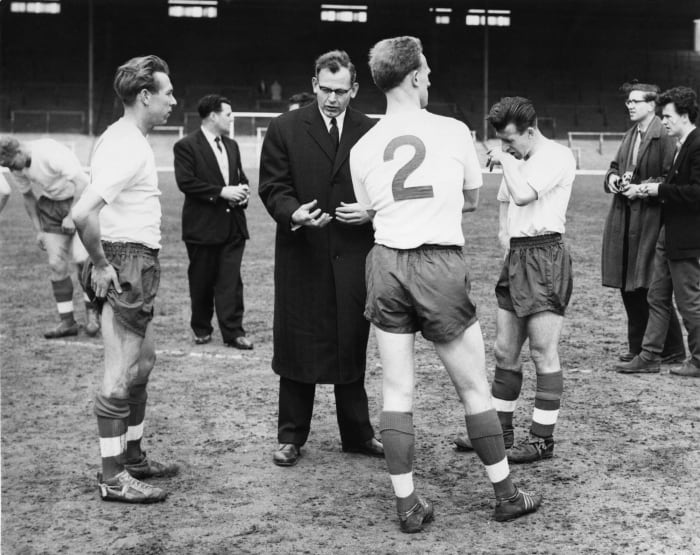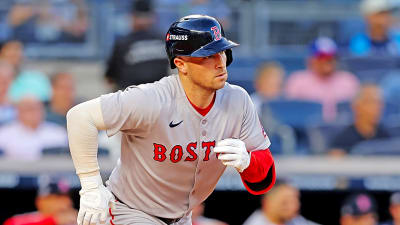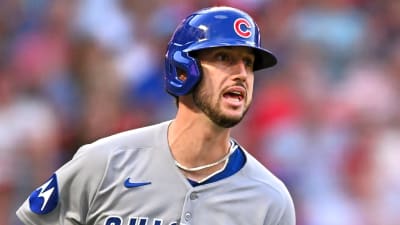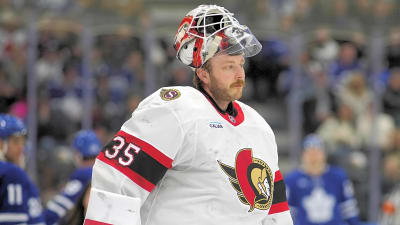These days, many — probably most — of the best football managers eschew national team gigs. You get paid more to manage a club team, and expectations are often more reasonable. When you manage a national team, you see players infrequently and then a big tournament rolls around and you have to try and do your best. That’s not ideal. On the other hand, if you find success on the national level, you can be a hero forever. To date, 15 people have served as a proper manager for England’s men’s national football team (sorry to Stuart Pearce and the other caretaker managers). These are those managers, and how they did in the role.
1 of 15
Walter Winterbottom
William Vanderson/Fox Photos/Hulton Archive/Getty Images
Winterbottom was the first manager for England, and the longest-serving. The country didn’t get into the international game until 1946, after the Second World War had ended. It’s the only managerial job he ever had, but Winterbottom was in charge from 1946 all the way through 1962. He managed the team at four World Cups, 1950 through 1962, and twice England made the quarterfinals. His teams picked up 78 wins total, still a record.
William Lovelace/Daily Express/Getty Images
Winterbottom paved the way for Ramsey to emerge as a legend. As a right back, Ramsey had actually played under Winterbottom. When he retired, he managed at Ipswich Town until he was chosen to follow the only manager England had ever known. Ramsey took over as England was preparing for the 1966 World Cup, which the country was hosting. No pressure. Maybe he really did feel no pressure, as England won that World Cup, the only one to date. Ramsey led England to a third-place finish at the 1968 Euros, the first time England was in the competition, and he stuck around until 1974. However, when the country failed to qualify for that year's World Cup, that was the end for Ramsey.
Evening Standard/Hulton Archive/Getty Images
Outside of Leeds United, Revie’s pretty much loathed. He spent over a decade managing Leeds, not only getting them promotion to top-flight football, but winning the First Division (the top level prior to the Premier League) twice. However, Revie and his teams were criticized for dirty play and marring “the beautiful game.” Revie’s success at Leeds led to him replacing Ramsey as England manager, but it proved disastrous. Not only did the team fail to qualify for the Euros in 1976, during World Cup qualifying for the 1978 tournament Revie went out to “scout Italy,” but was actually meeting with the United Arab Emirates football association to manage there. Why? For more money. So in a way Revie was a trendsetter in heading to the Middle East solely as a cash grab. This made him a pariah in England football, though, and he never managed in the country again (and his UAE teams found no success). Revie resigned as England manager after a mere 29 games.
Express/Express/Getty Images
After tremendous success as a manager at West Ham, Greenwood had left the sidelines to work in the club’s front office. When Revie resigned, though, England called upon Greenwood to try and get the country into the World Cup. While that bid failed through no fault of Greenwood’s, he was kept in the job. He got them into Euro 1980 and the 1982 World Cup, after which Greenwood retired from football. Notably, in 1978, Viv Anderson became the first black player to suit up for the English national team after being called upon by Greenwood.
Allsport/Getty Images
Robson was quite a good player for Fulham and West Brom, and played 20 caps with England, but he’s Sir Bobby Robson because of his managerial success. While managing Ipswich Town, he led the club to an FA Cup as well as a UEFA Cup (now the Europa League). That made him a smart choice to replace Greenwood. While England missed out on the 1984 Euros, the country stuck with Robson, and it paid off. The country made the quarterfinals in the 1986 World Cup and the semis in 1990. The FA did not sign him to a new contract — the idea of the “forever manager” was becoming antiquated — and Robson returned to club football. He won league titles in the Netherlands and Portugal, and then ended his career back in England managing Newcastle until 2004.
Ben Radford/Allsport/Getty Images
Taylor’s work at the club level, specifically at Watford where he is a legend, is undeniable. In his first tenure there he took the club from the fourth division up to finishing second in the first division (pre-Premier League, so the top flight of English football) within a decade. When he returned after his time with England, Taylor got them from Division Two to the Premier League once more. Of course, there’s the slight issue of his time with England. He got it into Euro 1992, but it did not make it out of the group stage. Then, ignominiously, England failed to qualify for the 1994 World Cup. That led to Taylor's resignation after 38 games in charge of the country.
Phil Cole/Getty Images
Venables bopped around London as a player and as a manager, played for four of the city’s clubs and managed three, and managed to throw in winning La Liga with Barcelona in the mix. A consummate “players’ manager,” England gave him the chance to get the club prime for Euro 1996, which was hosted by the country. England made it to the semis, but lost to Germany on penalties. The FA had already decided before the tournament it was going to move on, so Venables went to Australia and led it to the greatest success it had achieved to that point.
Phil Cole/Getty Images
Hoddle was named the new manager of England prior to Euro 1996, which made things a bit awkward for Venables and the squad. They managed just fine. The same can’t be said for Hoddle and his England tenure. Hoddle was a great player for Spurs, and had begun his managerial career with relative success at Swindon Town and Chelsea. That got him the England gig, where things got weird. He infamously included a faith healer on his coaching staff for the 1998 World Cup. The team made it to the round of 16, but then things got weird again as England prepped for Euro 2000. In an interview, Hoddle spoke of a literal belief in literal karma, and seemingly indicated that people with disabilities were being punished for their past lives. The controversy led Hoddle to be booted as England manager. He would rebound, though, and continued to manage in the Premier League and has worked as a TV pundit.
Mark Leech/Offside via Getty Images
England moved on from Venables after 23 games, and then was pushed into firing Hoddle after 28 games. Would Keegan provide stability? Nope! As a player, Keegan won two Ballon d’Ors. There, his skills were undeniable. As a manager, well, there’s a reason why his greatest success seemed to come at the lower levels. Keegan managed to get England into Euro 2000 after all the Hoddle chaos, but there he seemed tactically overmatched. After the country lost its first qualifier for the 2002 World Cup, Keegan resigned. It had been all of 18 games.
10 of 15
Sven-Goran Eriksson
Richard Sellers/Sportsphoto/Allstar via Getty Images
After a run of hiring decisions that didn’t pan out, for the first time the FA looked beyond the borders of England for a manager. Eriksson, Swedish by birth, had managed all over Europe. He was coming off leading Lazio to a Serie A title in the 1999-2000 season. Eriksson got England qualified for the 2002 World Cup, and led it to the quarterfinals. This was followed by quarterfinal appearances in Euro 2004 and the 2006 World Cup. After that, the country and the manager mutually decided to part ways. It had been three tourneys and 67 games, to be fair. Eriksson would go back to his vagabond roots, managing all over the world, including the national teams for Cote d'Ivoire and the Philippines.
Alex Livesey/Getty Images
When England needed to replace Eriksson it turned to…Luiz Felipe Scolari. The Brazilian turned the FA down cold, though, and so it pivoted to McClaren. This led to McClaren being labeled “Second Chance Steve” and the former Middlesbrough manager was put on the back foot, doing things like hiring Venables as an assistant to foster goodwill. That goodwill did not last long. While England started qualifiers for Euro 2008 well, infamously it would end up missing out on the tournament. McClaren managed England for all of 18 games in the span of about 16 months. He did rebound, though, by leading FC Twente to the Dutch league title in the 2009-10 season.
Laurence Griffiths/Getty Images
Real Madrid. AC Milan. Juventus. Capello had managed some of the biggest clubs in the world, and found tremendous success. England swung big in wooing the Italian manager, but it succeeded. Capello helped get England back on track, got it qualified for the 2010 World Cup, and led the team out of the group stage. He stuck around with the intent of managing the county at Euro 2012 and got England qualified relatively easily. Then, the FA took the captaincy away from John Terry without Capello’s approval. He resigned over this in February of 2012, and by that July he was managing the Russian national team. His England teams won 28 games in 42 contests. Capello’s win percentage is the highest of any England manager to manage more than one game.
Laurence Griffiths/Getty Images
Capello was intense, and he was Italian, so England pivoted and hired a British manager with a more congenial temperament. Also, a relative lack of imagination in terms of tactics. By 2012, though, the best way to handle being an international manager was to keep it simple. Hodgson had previously managed multiple national teams, so it was a safe approach. Things worked out…fine? Hodgson managed 56 games, and the team won more than half of them. He led the club to the quarterfinals at Euro 2012, piggybacking off Capello, but the 2014 World Cup and Euro 2016 were both unremarkable tournaments for England. Hodgson resigned after the 2016 tourney, but quickly joined his boyhood club Crystal Palace as manager.
Stu Forster/Getty Images
Somehow, the FA followed up Hodgson with an even less-inspired choice. “Big Sam” had built his reputation on dull football that helped teams in the relegation zone avoid relegation. You know, just what you want for your national team! Allardyce managed England to a win over Slovakia to begin qualifiers for the 2018 World Cup. Then, “Big Sam” was caught up in a “Daily Telegraph” sting operation trying to suss out corruption in English football. While hindsight has led to a general consensus that Allardyce did nothing illegal or wrong, he had been a little rash and foolhardy. Under all that scrutiny, England and Allardyce parted ways. He managed all of one game for the country.
15 of 15
Gareth Southgate
Michael Regan/Getty Images
We don’t want to knock Allardyce too much but… England may have lucked out in ending up with a better manager. Southgate had been managing the U21 team for the country, and he was promoted, first on an interim basis. It panned out with gusto. England finished fourth in 2018 World Cup, as runners up at Euro 2020, and made the quarterfinals at the 2022 World Cup. Southgate has stuck it out in the job as well, having gotten the club qualified for the 2024 edition of the Euros. He’s managed over 91 games for the country, and his run of success has been unseen in England since…Bobby Robson? Dare we say, Alf Ramsey? Depending on how Euro 2024 goes, Southgate could end up as no worse than the second-best manager the country has ever had. Not bad for a guy who only got the gig because of somebody else’s scandal.
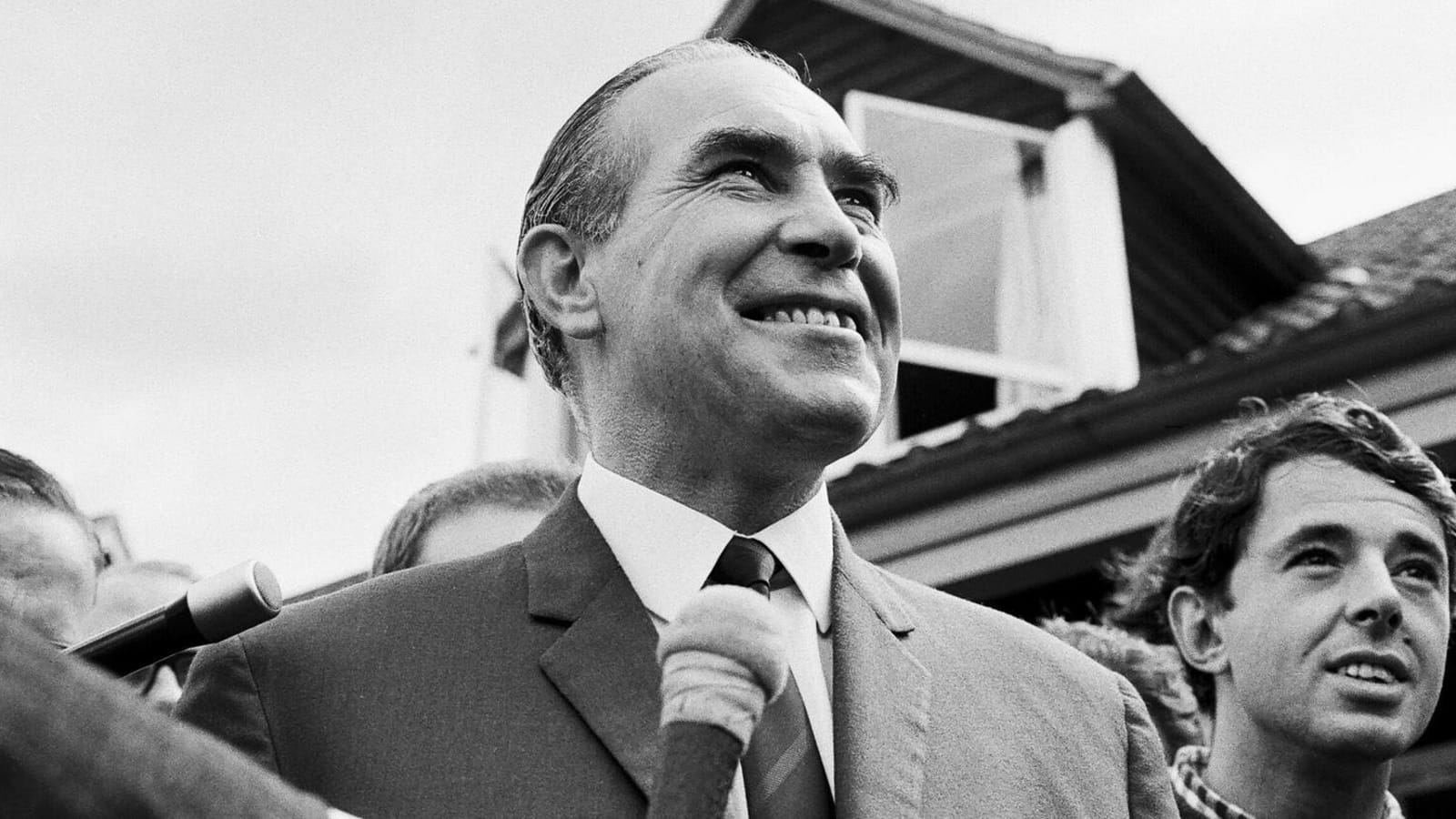
 +
+
